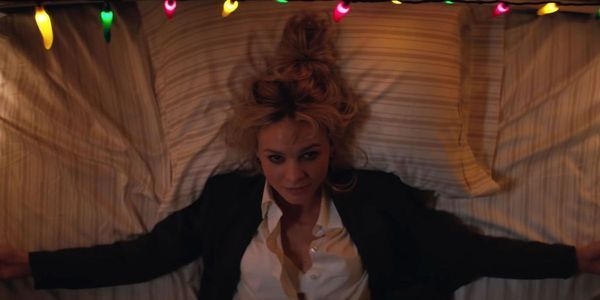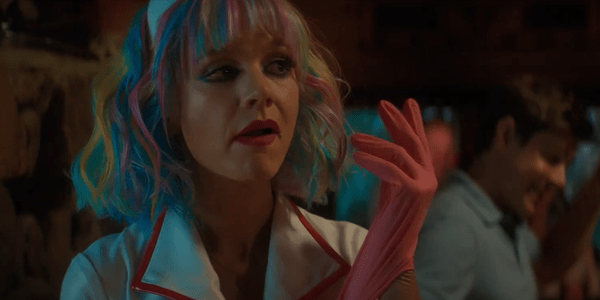PROMISING YOUNG WOMAN: The Dark Reality of Revenge
In 1989, Jodie Foster took home the Best Actress Oscar for her heartbreaking portrayal of rape victim Sarah Tobias in The Accused. Inspired by a real life case, Jonathan Kaplan’s courtroom drama was not only one of the first Hollywood films to use rape as its central subject, but was one of the first to reveal how victims can be put under the legal microscope just as much as their abusers. Jumping ahead into 2016, Isabelle Huppert won the Best Actress Golden Globe for her bold portrayal of another rape victim (under very different circumstances) Michele LeBlanc in Elle. Notorious for causing quite a stir with his blunt depictions of female sexuality, director Paul Verhoeven once again pushed the boundaries of political-correctness with his psychosexual thriller, which examined one woman’s complex reaction to being assaulted and how her lingering trauma following the attack caused her to form a sexual fascination with the abuser.
Aside from their well-deserved critical recognition, both actresses gave a voice to thousands of real-life victims who might have been too scared to speak up about their own experiences or struggled to understand their own behavior in the aftermath of such unfathomable crimes. And now, following the unwelcome hysteria that 2020 brought us, British actress Carey Mulligan is likely to gain similar praise for her portrayal of a woman on the hunt for justice in Emerald Fennell’s Promising Young Woman, which will no doubt join the ranks alongside those other timely tales with its stern refusal to let sleeping dogs lie.
DROP DEAD GORGEOUS
Thrown headfirst into a hip-thrusting montage of men dancing to the Nintendo-twinkle of Charlie XCX’s “Boys”, Fennell makes it obvious from the get-go exactly what kind of experience we’re in for and what state-of-mind is required to endure it. We then find ourselves in the company of three business tycoons drinking at a neon-lit bar and complaining about a female co-worker, whose focus is then pulled towards an intoxicated woman sprawled-out across a red leather couch on the other side of the dancefloor. With a skater-boy smile and sophisticated charm that could persuade even the soberest of candidates to jump in a taxi home with him, Jerry (Adam Brody) does exactly that, where – to his shock, a confrontation occurs with a now not-so-drunk, Cassandra (Mulligan).

Still living with her parents after dropping out of med school and working day shifts in a coffee shop alongside her sassy manager, Gail (Laverne Cox), Cassandra’s routine appears suspiciously aimless for someone who once planned to save lives for a living, but as we’ve already learned, that humdrum existence is driven by obligations far more urgent than finding a stable career or even making time to date. Yet, that possibility isn’t thrown entirely overboard. After a hilarious customer interaction with a flame from the past, Ryan (Bo Burnham), Cassandra is coaxed into going on a date after he proves his sincerity by drinking from a coffee she spat in seconds earlier. It’s only after Cassandra’s hidden agenda becomes further sidetracked that she realizes building a future with a man is pointless until she has dealt with the past, and as she plays the balancing act between her new love interest and continuing the nighttime escapades, that’s when things take a nasty turn.
Apart from a mid-highway meltdown – which, mind you, will prove to be more of a crowd-pleasing moment for many compared to what Fennell’s unconventional climax offers – we have no reason to believe that Cassandra plans to fight fire with fire – she seems smarter than that. And yet, there’s still something simmering beneath the surface and it’s only when the narrative threads of Cassandra’s past begin to tighten that we start to get a sense of where it all might be heading, but never quite enough to know what’s in store for us when we arrive at the final destination.
It’s not until a drastic “Harley Quinn” transformation in the final quarter that we feel those responsible will finally be anointed with Cassandra’s kiss-of-death, but in a single heart-stopping moment, Fennell switches gears and her rollercoaster ride comes to a complete stop, leaving us hanging upside-down mid-loop and gasping for air. It’s a bold narrative risk that you’d imagine only someone with an ingenious craft like Hitchcock could have gotten away with during his prime, but Fennell pulls it off with flying colors and not only redefines the film’s central message but the entire genre itself.
THE WEB OF GLITTERING DECEIT
Traditionally, cinematic revenge sticks to a recognizable formula, usually following one or more antagonists who are responsible for a crime that drives a victim’s hunger for justice. Tarantino’s infamous Kill Bill: Volume 1 and Kill Bill: Volume 2 are a masterful execution of this theory; a blood-splattered bride awakens from a coma and hunts down her enemies one-by-one to settle the score. It’s a satisfying – if not, foolproof model, but Fennell’s film takes a route that’s rarely explored in modern cinema, instead choosing to reveal both sides of the same coin, landing on what some might call an “unfortunate gamble.” But that doesn’t mean the journey to get there is all gloom and doom either – it’s quite the contrary.

There are a handful of smile-inducing moments that make Promising Young Woman a wildly amusing endeavor, including a sequence between Mulligan and Burnham dancing in a pharmacy to a Paris Hilton song playing on the radio that’s a real spark-flying moment. Not to mention, the entire look of the film is painted in a playful “dollhouse” aesthetic, and Fennell sometimes stamps scenes with video game-ish flourishes to heighten the audio-visual enjoyment factor overall.
Throughout the narrative, we expect the trail of breadcrumbs that Cassandra leaves will lead to the motives that drive her behavior, but it’s through the network of acquaintances from her past that ultimately crystallize it all. Between short but sharp cameos featuring Connie Britton, Alison Brie, and the criminally underused Molly Shannon, Fennell makes a point that, while rape culture is statistically linked to men, sometimes “innocent” bystanders can fall through the cracks and those people can sometimes be women. The director makes a solid point about laws protecting those individuals and how sweeping crimes under the rug to protect so-called “reputations”, can be just as dangerous as the acts of violence themselves. She has a firm grip on her concept and executes it with meticulous artistry, but it’s only between the contrasting sweetness of the script and the sourness of the conclusion that we realize this is a very, very different cocktail of revenge.
A BITTERSWEET SYMPHONY
Beyond all the pop culture distractions leading up to its heart-stopping showdown, the film sizzles with ambition and poses as a searing commentary on how (and why) gender politics are changing over time. And, of course, it shows how cinema has continued to be a powerful outlet to expose those damaging traditions, even when turning-the-tables still comes at a high cost. The entire package is a clever exercise in audience alienation and re-calibrates the structure of commercial storytelling, perhaps to remind us that “life is all fun and games until someone gets hurt.”

Promising Young Woman sacrifices its opportunity to deliver the ultimate revenge fantasy for something unexpectedly profound and to an extent, thematically necessary. What at first seems like a candy-coated saga that’s been made to satisfy our most voyeuristic cravings, ends up rewarding up with a slap across the face for having those very desires. Blind, these stars are not.
Have you seen Promising Young Woman? If so, what are your thoughts on the film’s subversive ending? Leave your comments in the section below.
Promising Young Woman was released in the USA on the 15th of January (VOD) and will be released in the UK on the 12 of January, 2021. For other release dates, please click here.
Watch Promising Young Woman
Does content like this matter to you?
Become a Member and support film journalism. Unlock access to all of Film Inquiry`s great articles. Join a community of like-minded readers who are passionate about cinema – get access to our private members Network, give back to independent filmmakers, and more.
Join now!





